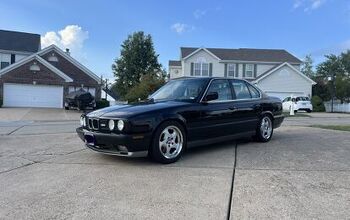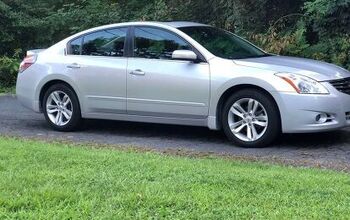Are Fat People Driving Up The Price Of Gas? Are They The Source Of The Greenhouse Effect?

Yes, and yes, says a study of the Resources for the Future (RFF) institute. The Washington think tank’s study examined “the unexplored link between the prevalence of overweight and obesity and vehicle demand” for bigger and more gas guzzling cars.
RFF brands itself as a “nonpartisan organization that conducts independent research.” Their study found “that the prevalence of overweight and obesity has a sizable effect on the fuel economy of new vehicles demanded. A 10 percentage point increase in the rate of overweight and obesity among the population reduces the average miles per gallon (MPG) of new vehicles demanded by 2.5 percent, an effect that requires a 30 cent increase in gasoline prices to counteract.” Basically what they are saying: Fat people choose fat cars. More fat people, more fat cars.
Shame on you if your belly keeps you from reading the numbers on the bathroom scale, you are driving up the cost of our gas, fatso. If you would eat less, we would pay less. If the study is correct.
The study is a bit dated (August 2009), and with names such as Shanjun Li, Yanyan Liu, and Junjie Zhang, the authors of the study may be a bit biased. Alternating between China and Japan, most foreigners (myself included) appear fat to me, or debu-debu as they say in Japan. I stumbled across this study because of the serendipity of two stories that appeared this weekend.
The top story of Automotive News [sub] is “Ford leads the way as automakers embrace weight-loss.” In their cars, not amongst their customers. “Weight is absolutely critical,” said Ford CEO Alan Mulally for saving gas and in order to reach CAFE rules that require a fleet average of 35.5 miles per gallon by 2016. There already is talk about a 62-mpg target for 2025. Ford’s diet regimen clashes with another trend.
Over at AOL Autos, there is an article titled “Super Size Me? How About My Car?” It muses about the buying habits of the Generation XXL: “Extra-large Americans get up and go to work like anyone else and they need vehicles to get them there and back. Is the auto industry paying attention?” In that story, interviewed carmakers deny that they target obese people per se. Instead, they indeed pay attention to what the customer wants. “We’re finding that people say, ‘We want more space,’” said Sage Marie, Manager of Honda Product Planning.
If people want bigger cars, they get bigger cars. AOL Autos complains that there are “few reliable statistics on which cars are most accommodating for larger people.” As we soon shall see, they did not look hard enough. All AOL found was a list compiled last year by Consumer Reports that recommends “several good cars that are best for larger drivers,” as CR said.
Oddly enough, the cars all hail from the lands of lithe, from Japan and Korea:
Make/model PriceCR overall mpg Honda Accord$22,79523 Honda Odyssey$32,61019 Hyundai Azera$31,67020 Kia Rondo$20,65521 Subaru Forester XT Limited$28,86020This is a list of cars CR thinks hefty people should buy. It’s not a list of what they buy. That led to the study mentioned above. The authors claim that they have irrefutable proof that people who can’t stop eating choose cars with a serious drinking disorder.
The greater the share of fat people, the greater the share of gas guzzling light trucks. Shazamm!
What’s more, RFF tells us (using EPA data) that the fuel economy of all new vehicles (green line) peaked in 1987. It was all downhill from there until a slight pick-up in 2005. It must have been all those non-HWP people buying big rigs.
The study reminds us that “medical cost of overweight and obesity accounted for 9.1 percent of total U.S. medical expenditures in 1998 and reached $78.5 billion, half of which were through financially-distressed Medicare and Medicaid systems.” While people increased in heft, there emerged “a seemingly unrelated but equally significant trend: The dramatic increase in the number of large passenger vehicles on American roads.” Which of course make us dependent on oil from “politically unstable” countries, fill the air with pollution, and give us skin cancer through the ozone hole.
Says the study: “Our simulation results show that had the prevalence of overweight and obesity stayed at the level in 1981 (about 20 percentage points lower than that in 2005), the average MPG of new vehicles demanded in 2005 would have been about 4.6 percent higher, everything else being equal. The improved fuel efficiency implies total gasoline savings of about 138 million barrels and reduction in CO2 emissions of 58 million tons over the lifetime of these vehicles.”
The theory is being put in question by a commentator in a discussion forum. When someone recommended a Ford F-150 or Chevy Silverado as the perfect ride for the circumferentially challenged, the reply was:
“Gotta climb UP into those… “

Bertel Schmitt comes back to journalism after taking a 35 year break in advertising and marketing. He ran and owned advertising agencies in Duesseldorf, Germany, and New York City. Volkswagen A.G. was Bertel's most important corporate account. Schmitt's advertising and marketing career touched many corners of the industry with a special focus on automotive products and services. Since 2004, he lives in Japan and China with his wife <a href="http://www.tomokoandbertel.com"> Tomoko </a>. Bertel Schmitt is a founding board member of the <a href="http://www.offshoresuperseries.com"> Offshore Super Series </a>, an American offshore powerboat racing organization. He is co-owner of the racing team Typhoon.
More by Bertel Schmitt
Latest Car Reviews
Read moreLatest Product Reviews
Read moreRecent Comments
- Calrson Fan Jeff - Agree with what you said. I think currently an EV pick-up could work in a commercial/fleet application. As someone on this site stated, w/current tech. battery vehicles just do not scale well. EBFlex - No one wanted to hate the Cyber Truck more than me but I can't ignore all the new technology and innovative thinking that went into it. There is a lot I like about it. GM, Ford & Ram should incorporate some it's design cues into their ICE trucks.
- Michael S6 Very confusing if the move is permanent or temporary.
- Jrhurren Worked in Detroit 18 years, live 20 minutes away. Ren Cen is a gem, but a very terrible design inside. I’m surprised GM stuck it out as long as they did there.
- Carson D I thought that this was going to be a comparison of BFGoodrich's different truck tires.
- Tassos Jong-iL North Korea is saving pokemon cards and amibos to buy GM in 10 years, we hope.




































Comments
Join the conversation
I am downright skinny. But I used to be 50 pounds heavier just five years ago. However, I did not become more moral or enlightened by losing the weight. I did not suddenly become smarter or prettier than before. I am not superior to whom I used to be. There is no crime in being fat, nor should there be a crime in being fat. Fat people buy more expensive cars to support their driving needs. There is nothing wrong with that. When our cars were thousands of pounds heavier than today, the folks who drove those cars were dozens of pounds lighter than folks today too. Yet they drove big cars, right? The size of your car may reflect on your fatness, but just as often, it does not. Claiming that fat people are causing the price of gas to go up is looking for a scapegoat instead of trimming our own fatty lives. If you have already trimmed down both your figure and your automobile, then shut the hell up and help others do the same without preaching at them. We will not reach the Garden of Eden. We will not rekindle the Natural Man. We will not make either us or the Earth pure, because the purity needed for the Earth is already established. We poop. We eat. We pee. And the Earth can handle it. Fingerpointing at one another in an effort to guilt someone or to make you feel better is immoral. Stop the preaching. Stop the self promoting. Stop the smears. Stop claiming that those who are not you are stupid because only insane people do that. Take responsibility for your own actions and hope the example you set spurs others to follow you. The fact that others do not is not a statement that you are wrong. Get over yourself.
A weak study, even weaker article, and many simplistic posters. No wonder they laugh at Americans! The price of gas is determined by the oil cartels. Then they hire propagandists to blame the little guy, in this case fat people. If we are concerned with using too much gas, why don't we go back to driving 55? That would save a tremendous amount of gas! Is anyone complaining about Americans shopping too much and carrying around all those packages in the back seat? How about people who refuse to car pool? Furthermore, obesity is correlated with poverty in the U.S. So many poor fat people must buy smaller cars, take public trans, or conserve in other ways. Only people with diminished intellectual capacities could really blame a fat person of lower socio economic status for gas prices and let the true fat cats (the oil companies) off the hook! p.s. I happen to weight 235, proud of every healthy beautiful ounce and I gave up my car yrs ago out of environmental concerns. Unless you did the same, quite whining about fat people! p.s. It is YOUR privilege to sit next to me on an airplane, bus, or anywhere else!!!